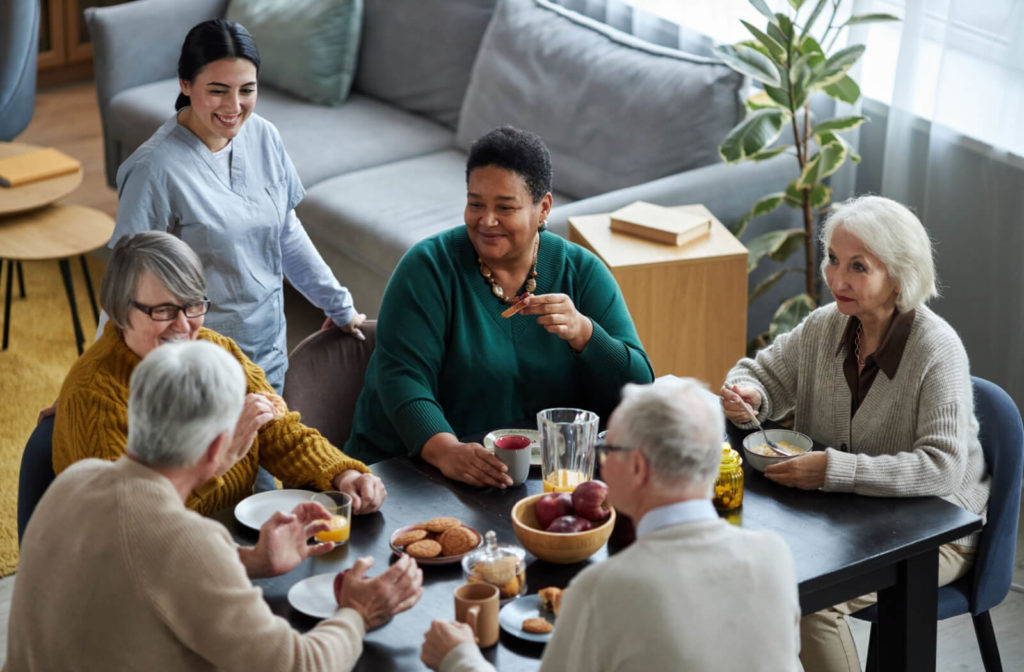Experience outstanding Assisted Living with compassionate caregivers.
Experience outstanding Assisted Living with compassionate caregivers.
Blog Article
Exactly How Aided Living Facilities Enhance Top Quality of Life for Those With Mental deterioration
Helped living facilities play a critical role in boosting the high quality of life for individuals with mental deterioration by applying tailored care methods that satisfy their distinct demands. These environments combine structured tasks with psychological support, cultivating a sense of area while making certain safety and security and independence. The assimilation of appealing programs and family involvement further enriches the residents' experience. The intricacies of mental deterioration care continue to advance, triggering a better evaluation of how these facilities adapt and introduce to meet the difficulties faced by locals and their families. What implications does this have for future care versions?
Personalized Care Plans
(Dementia Care Charlotte)Oftentimes, individuals with mental deterioration call for customized assistance that resolves their unique needs and preferences. Individualized treatment strategies are crucial in assisted living settings, as they make certain that each resident gets ideal attention and services. These strategies are developed collaboratively, including health care experts, caretakers, and relative to produce a comprehensive overview of the person's clinical background, cognitive capacities, and individual rate of interests.
A well-structured individualized care strategy normally consists of particular goals associated with wellness management, everyday activities, and social engagement. It represents the person's cognitive decrease while advertising self-reliance and self-respect. Regular assessments and updates to the treatment plan are essential, as they enable for adjustments based upon the local's developing condition and preferences.
Key parts of these strategies typically entail drug monitoring, behavior support approaches, and nutritional guidelines customized to the individual's needs (Assisted Living). By concentrating on individualized care, assisted living facilities can promote a helpful setting that improves the top quality of life for individuals with dementia, ultimately adding to their total well-being and happiness. This individualized strategy appreciates the individuality of each citizen, ensuring they get the compassionate treatment they need

Engaging Tasks and Programs
Engaging homeowners in significant tasks and programs is essential for enhancing the lifestyle for individuals with mental deterioration. These activities not just provide satisfaction however also boost cognitive function and advertise social communication, which can minimize feelings of isolation frequently experienced by homeowners.

In addition, personalized programs are important in making sure that each citizen's one-of-a-kind preferences and abilities are acknowledged. This tailored strategy urges participation, improves self-esteem, and offers a sense of achievement.
Moreover, normal assessments of residents' interests can aid team change and adapt activities to far better match advancing needs. By prioritizing engaging tasks and programs, helped living facilities can substantially improve the general experience and psychological wellness of people coping with mental deterioration.
Safe and Helpful Environment
Creating a secure and encouraging setting is crucial for individuals with mental deterioration, as it directly influences their well-being and lifestyle. Aided living centers are developed with particular features that advertise security while promoting a feeling of safety and comfort. These environments focus on accessibility, with layouts that decrease complication and motivate independence, permitting citizens to browse their surroundings much more conveniently.
Security procedures, such as secure entrances and leaves, protect against wandering and unauthorized accessibility, which are important considerations for people with dementia (Assisted Living). Personnel are trained to acknowledge the unique demands of citizens, providing tailored assistance and supervision to guarantee their safety. Moreover, the consolidation of calming colors and familiar items can aid decrease anxiousness and disorientation, creating a more comforting atmosphere.
Along with physical security, psychological assistance is critical. Facilities frequently use personnel that are not only proficient in caregiving but also educated in compassion and communication, cultivating count on and connection with homeowners. This all natural approach contributes to a nurturing setting where people feel valued and understood, inevitably improving their overall lifestyle.
Social Communication and Community
A helpful atmosphere not just focuses on safety and security yet also fosters opportunities for social interaction and neighborhood involvement, which are important for people with dementia. In assisted living facilities, structured activities and public areas motivate residents to get in touch with each other, lowering sensations of seclusion usually experienced by those with cognitive problems.
Social communication see this here plays a substantial role in boosting psychological wellness and cognitive function (Memory Care). Engaging with peers in team tasks such as video games, arts and crafts, or exercise not just boosts cognitive capacities however additionally nurtures a feeling of belonging. Facilities commonly organize events that promote socializing, permitting residents to build connections and share experiences, which can be particularly useful for those with dementia
Furthermore, a vivid area ambience can boost the overall top quality of life for homeowners. Staff members are trained to assist in interactions and support homeowners in forming significant links.
Household Participation and Support
Family members participation is important in sustaining individuals with dementia in assisted living atmospheres. Proactively engaging household participants not just offers psychological convenience to homeowners however additionally fosters a sense of belonging and connection in their lives. When family members take part in treatment planning and day-to-day tasks, they contribute beneficial insights about the individual's choices, background, and requires, which can enhance personalized care.
Additionally, normal household check outs can dramatically improve the emotional wellness of homeowners, decreasing feelings of isolation and stress and anxiety. Member of the family can likewise help in keeping cognitive function by engaging their liked ones in familiar conversations and activities. This interaction strengthens personal identification and aids residents feel valued and comprehended.

Final Thought
In verdict, assisted living centers dramatically improve the high quality of life for individuals with mental deterioration via individualized treatment plans, involving activities, and a secure atmosphere. These elements foster cognitive excitement, emotional well-being, and a feeling of freedom. Additionally, regular social interactions and solid family participation add to meaningful links and psychological support. Collectively, these variables develop an all natural method to care that addresses the special requirements of individuals with mental deterioration, promoting total well-being and self-respect.
Report this page